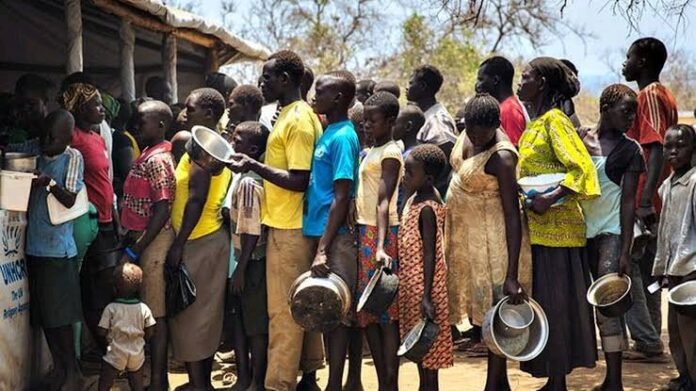(DDM) – The United Nations World Food Programme has issued a stark warning that nearly 35 million Nigerians could face severe food insecurity by 2026, marking what experts describe as the most alarming hunger projection in the nation’s history.
Diaspora Digital Media DDM gathered that the latest alert draws from the Cadre Harmonisé food security analysis, which shows an unprecedented surge in hunger, driven by intensifying insurgency, worsening economic stress, and persistent instability across northern Nigeria.
The lean season in the region typically falls between June and August, a period before the major harvest when food stocks are depleted, market prices soar, and rural households become increasingly vulnerable.
This period is particularly devastating in farming communities already crippled by violent attacks, land abandonment, and disrupted agricultural cycles caused by armed groups.
According to the WFP, the conflict landscape has deteriorated significantly throughout 2025. Jama’at Nusrat al-Islam wal-Muslimin (JNIM), an al-Qaeda affiliate, reportedly launched its first attack in Nigeria last month, adding a new layer of insecurity to a region already battling the expansion of the Islamic State in West Africa Province (ISWAP).
These developments are reshaping the conflict map across the Sahel and placing additional pressure on communities already struggling with chronic hunger.
“Communities are under severe pressure from repeated attacks and economic stress,” said David Stevenson, WFP’s Country Director and Representative in Nigeria.
He warned that food shortages could become a powerful recruitment tool for extremist groups, noting that hunger is increasingly being weaponised to exploit vulnerable populations.
The consequences are particularly severe for rural farming communities in Borno, Adamawa, and Yobe states.
Nearly six million people across these conflict zones are projected to face crisis-level food insecurity or worse during the 2026 lean season.
In Borno alone, roughly 15,000 people could experience catastrophic hunger resembling famine conditions, placing them at the highest alert level of humanitarian emergency classifications.
Children remain the most vulnerable, with malnutrition levels in Borno, Sokoto, Yobe, and Zamfara rising from “serious” to “critical” in numerous districts. Clinics that once provided nutrition support have scaled down or shut entirely due to funding shortages, worsening the crisis.
The WFP disclosed that nearly one million people in Nigeria’s northeast depend on its food and nutrition support. However, budget cuts in July forced the organisation to reduce operations, leaving over 300,000 children without essential assistance.
Despite escalating needs, the agency warns that its funding will run dry by December, placing millions at risk in 2026 and heightening the likelihood of social unrest and cross-border instability across West Africa.
Stevenson stressed the urgency of international intervention, stating: “This is not just a humanitarian issue; it is a security issue that requires immediate global attention. Millions of lives are at stake, and action must be taken now to prevent further catastrophe.”
The UN fears that without rapid financial support, the hunger crisis will deepen, destabilising Nigeria’s fragile regions and fuelling violent extremism in the wider Sahel.







